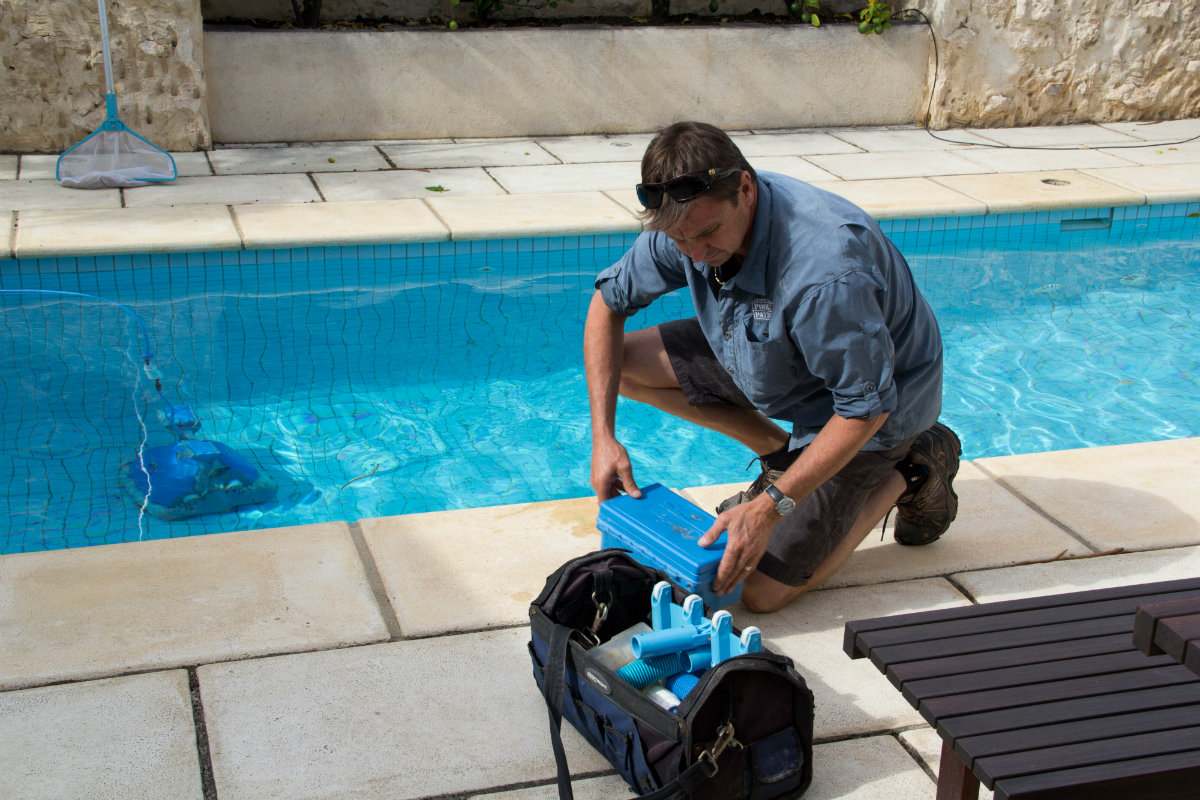The pool industry attracts a large number of people who want to make a go of it as service professionals. Increasing interest marks a trend that started in the recession and continues today.
“The majority of the routes we sell, maybe 80 or 90%, are sold to people who are brand new to the pool-service industry,” says Cory Mouillesseaux, an owner of SpringBoard Route Brokers in Folsom, Calif.
But there are a number of ways to start a pool-service business. Each requires careful consideration.
For the prospective pool guy or gal, we hope reading this will be your first step toward a long and fruitful career in a fun, challenging field.
GOING ORGANIC
You want to become a business owner? Right out of the gate you have a big business decision ahead of you: Should you buy a route or start one organically?
If you have patience and possess some marketing know-how, consider going the path less traveled and grow your business from scratch. One advantage: This approach requires very little debt. Buying a route, on the other hand, can cost tens of thousands of dollars, easily your largest expense, provided you already own a truck. The disadvantage to beginning organically? It can take time to generate sufficient income.
Matt Masiewicz has always favored this approach. He successfully nurtured two service businesses this way. His first was in Orange County, Calif. , and grew to 85 accounts through grit and determination. Now he’s in Idaho, where pools aren’t exactly plentiful, but he’s not lacking work.
“Pools are pretty easy to come by if you do good work and if you have a basic skill of marketing,” says Masiewicz, owner of Atlantis Pool & Spa in Nampa, Idaho.
There are a number of ways you can develop a customer base, one of which is called a “work-off.” In this arrangement, you can work for an established pool professional for free or reduced pay with the agreement that you would earn a certain number of accounts at the end of a stipulated period. Of course, this only works if you’re generating actual income through other means in the interim, but it’s a low-cost way to enter the field and gain valuable on-the-job experience, Masiewicz says.
You also can partner with pool builders to land new accounts. Contractors can bake the cost of your labor into the construction of the pool, using the one-month-of-free-service offer as an effective selling point. Many builders aren’t interested in providing the service right after construction, especially when plaster dust complicates maintenance during the start-up stage. So it’s a win-win for you and the builder.
At the end of the month, approach the homeowner about continuing with service at your rate. Provided you did good work, they’ll likely take you up on it.
“If someone is going to drop $60,000 to $80,000 on a swimming pool, most likely they’re not going to want to take care of it themselves,” Masiewicz says.
A caveat: Don’t expect to do any repairs. Usually new equipment is under warranty for two to three years, and the builder usually handles those repairs.
There are also myriad home-service platforms that can connect you with pool owners in need of service. HomeAdvisor, Angie’s List and Amazon Home Services make up only a few among a dizzying number of contractor/homeowner matchmaker services. And there are pool-specific programs such as pHin and Sutro that are worth considering. Fees vary across platforms. You can use these to bid on one-off tasks such as filter cleanings or ongoing maintenance.
-
The Gig Economy and the Future of Pool Service
How new technology coming out of Silicon Valley intends to simplify pool care and streamline your business

Bottom line: There are a variety of ways to piece together a lucrative route. If you’re good, the pools will find you. Masiewicz says his best lead generator is online reviews posted by satisfied customers. “I always ask customers, ‘Why did you choose me?’ and they say ‘Because of your reviews.’”
THE INSTANT ROUTE
Lured by the prospect of immediate revenue, most upstart pool professionals enter the field through the purchase of a route.
They generally cost 12 times the monthly service rates on each account. In other words, if a route generates $5,000 a month, you can expect to pay $60,000.
But proceed with caution. Professionals recommend going through a reputable route broker. It safeguards the buyer from being saddled with nonpaying customers and problematic pools. Ultimately, the broker ensures both parties get a square deal.
The broker lists available routes for sale and then, after vetting the potential buyer, connects him or her to a seller. The buyer then goes on a tour of the seller’s accounts. During this time, you can request a payment history on each account, see the condition of each pool and how far they are spaced apart. A good route is a tight route. Generally, you’ll want to aim for two pools an hour, so the closer they are together, the better. Newer pools not surrounded by debris-shedding vegetation and featuring modern equipment would also be desirable.
Once the transaction is complete, the buyer is generally afforded a two-week training period with the seller, after which customers are notified that their pools are under the care of another professional.
-
The Gig Economy and the Future of Pool Service
How new technology coming out of Silicon Valley intends to simplify pool care and streamline your business

Keep in mind: You may own the route, but customers still can fire you, move or decide to clean their own pools. That’s why most brokers include a clause in the contract stipulating that any accounts lost during a given period, typically 90 days, will be replaced by the purchaser. That’s only if the buyer did not increase his or her rates or make any other “material changes” to the service provided.
For this reason, many service pros swear by brokerages. They can act as your best defense against crooked sellers who provide little to no training and may even try to steal back accounts after the transaction.
But this instant customer base can pose some pitfalls to the neophyte. Some overconfident types get in over their heads by buying too much too soon, then struggle to keep up with the workload. That could lead to a very short career in the pool and spa industry.
That’s why Mouillesseaux, the Southern California broker, recommends to some newcomers a more cautious approach. Buying a part-time route is a perfectly reasonable option. In fact, it’s how Mouillesseaux got his start. He bought just enough accounts to work three days a week, getting his bearings before going full-time.
Another tip: “If you have the option of picking a time to get into the industry, winter is best because pools are a little easier to maintain,” Mouillesseaux says.
Come summer, you’ll be algae’s biggest threat.
JOIN AN ASSOCIATION
Independent service professionals wear a lot of hats. Their work isn’t done when they clean the last pool for the day. At the home office, you’ll be an accountant, marketer, customer-service manager and all-around administration executive. This could quickly lead to burnout. Outsource what you can so you can focus on what you do best: Keeping pools safe and clean.
“Find those resources right away, because you’re going to need them,” advises Steve Donohoe, owner of Another Perfect Pool in Mission Viejo, Calif.
Also — and this is a big one — surround yourself with people who know more than you. There is no better way to do that than by joining an industry association, preferably one that has a chapter in your area that meets once a month.
There are two major benefits of belonging to either the Independent Pool and Spa Service Association or the United Pool Association: Insurance and sick-route coverage. Rest assured, at some point you will fall ill or get injured. That this industry has people willing to fill in for you, at no cost, makes it truly unique among other service trades. Other perks include educational opportunities and a general camaraderie that you won’t find anywhere else.
You’ll be among some of the smartest people in the business, who’ll gladly share expertise.
“Pool guys love to tell you how much they know,” Donohoe says.
Welcome to the pool industry.



